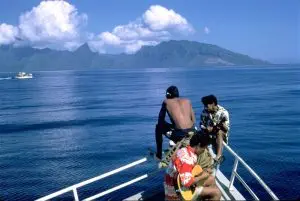Can we change how tourists treat the planet?
More than almost any other industry, tourism, now the World’s largest employer and chief source of foreign exchange for dozens of countries, is taking significant actions to conserve many of the places it uses as its key resource. Charter airlines are playing conservation related movies as the plane descends to its destination – asking tourists to respect the environment, not damage the reef, avoid buying corals and other threatened products. Some cruise ships provide information on how to behave in local communities, fragile ecosystems or around wildlife to those who visit on shore. The UN World Tourism Organization is involved in new measures of what to sustain and the provision of means to implement improved practices worldwide.
The Global Sustainable Tourism Council (GSTC) establishes and manages global sustainable standards, known as the GSTC Criteria. There are two sets: Destination Criteria for public policy-makers and destination managers, and Industry Criteria for hotels and tour operators. These are the guiding principles and minimum requirements that any tourism business or destination should aspire to reach in order to protect and sustain the world’s natural and cultural resources, while ensuring tourism meets its potential as a tool for conservation and poverty alleviation. This provides support to governments and industries and helps to define expectations for destinations and enterprises who wish to be identified as sustainable. Tourists are increasingly being recruited to support and often act as informal enforcers of actions to keep the places they visit in good condition – economically, socially and environmentally.
The following article is an interesting example from Palau . Also a form of wish list follows (the tourist Desiderata) as an inspirational document to get tourists and the places they visit to work together to keep tourism a positive force for planetary sustainability.
Pacific’s Palau forces tourists to sign eco-pledge
(Travel Magazine Dec 2017)
Visitors to the tiny Pacific nation of Palau are being made to sign a promise to respect the environment, in an innovative move that authorities hope will curb ecological damage caused by booming numbers of tourists.
Claimed to be a world first, the “Palau Pledge” is stamped onto visitors’ passports and must be signed upon arrival in the country, which lies in the western Pacific about halfway between Australia and Japan.
“I take this pledge as your guest, to protect and preserve your beautiful island home,” it reads in part.
“I vow to tread lightly, act kindly and explore mindfully.”
With crystal clear waters, pristine reefs and abundant sea life, Palau is regarded as one of the world’s best diving spots and was once a niche tourist destination.
But visitor numbers have exploded in recent years, particularly from China, straining both infrastructure and the environment.
The symbolic pledge was written with the help of Palau’s children and President Tommy Remengesau said it was about preserving the environment for future generations.
“Conservation is at the heart of our culture,” he said.
“We rely on our environment to survive and if our beautiful country is lost to environmental degradation, we will be the last generation to enjoy both its beauty and life-sustaining biodiversity.”
Palau welcomed almost 150,000 tourists last year, up 70 percent on 2010 figures and the nation of 20,000 has struggled to cope.
Some of the new arrivals have caused outrage among locals by capturing turtles so they can take selfies with them, walking on fragile coral and leaving trash on beaches.
“The Palau Pledge aims to encourage environmentally sound habits in visitors,” the government said in a statement.
“If action is not taken now, it will get to the point where it is too late to protect some of the most unique parts of the country.”
Read more: http://www.digitaljournal.com/news/world/pacific-s-palau-forces-tourists-to-sign-eco-pledge/article/509473#ixzz50hHI4kqE
A tourist Desiderata
A few years back, Tourisk Inc. (Ted and Margo Manning) in collaboration with Wild International (Carolyn Wild) – all CACOR members – crafted the following as a way to inspire better tourism and limiting impacts.
Tourist Desiderata
|
|
What Tourists Need:Essentials for tourism to take place
· Personal security: Ability for the tourist to realistically avoid personal injury or risk to health
· Clean facilities: Availability of clean accommodation and access to acceptable toilet facilities
· Safe food: Access to clean water and to food which is safe to eat
· Health services: Access to health facilities in emergencies
· Essential contact: Communication capability – at least the ability to contact authorities or embassies
· Currency and Value for Money: A functional currency which is accepted locally. A fair exchange rate and fair pricing for goods and services §§§§§§§§§
What Tourists Want: Desirables to sustain tourism
· Ability to book accommodation and tours from abroad
· Good information available in advance regarding conditions, expectations, access.
· Ability to use telephone and/or internet to access home and/or help
· Access to news (print or media) in the language of the traveller
· Availability of guides, information and help in the language of the traveller
· Secure place to leave valuables (safe or deposit box)
· Friendly local residents who welcome tourists
· Availability of a variety of experiences in the destination with good value for money
· Ability to purchase familiar food
· Clean environment -particularly beaches, resorts
· A functional exchange system – including use of credit cards, travellers cheques, electronic funds
· Access for those who may need assistance to reach key attractions
· Absence of paper barriers -requirements for visas, guarantees, deposits, etc.
· Absence of harassment
· Easy direct flights and convenient connections Sustainable tourism means tourism which benefits both the tourist and the residents of the destination… where both gain from the opportunity to have new experiences.
Tourisk Inc. and Wild International 2006 |
The Tourist Desiderata has been prepared by Margo Manning and Ted Manning of Tourisk Inc. and Carolyn Wild of Wild International as a stimulus for tourists and destinations to think about what tourists want, and what hosts need to consider. It is provided both in poetic and bureaucratic language, as tourism is not just an industry, but one which deals inherently in images and experiences.
Based on research and consultations in more than 60 countries, this compilation was begun based on work associated with the resurrection of tourism around the Black Sea in the early 1990s, and expanded through workshops and observations regarding tourism in new and mature destinations in Latin America, the Caribbean, South and East Asia, Africa, Australasia and North America. What is clear is that without a number of basics in place, communities and destinations can neither attract tourism nor maintain and sustain it. The practical form of the list is divided into two categories: essentials (which must be in place for any tourism to come) and desirables – which contribute to the ability of destinations to retain tourism and build upon it.
The list which follows takes the desiderata one step further – in what is essentially an applied tool which can help destinations to determine how they fare relative to the Desiderata.
Are you tourism ready?
Identifying key barriers which impede tourism establishment and development:
Access
Entry documents: Is a visa required. If so, how easy is it to obtain (time required, ease of access to issuing office, documentation required, cost).
- Border procedures: How difficult is it to pass through the border (time, cost, level of formalities, certainty that a traveler will be admitted, allowed to depart). What are the restrictions on export of personal possessions, currency, souvenirs and artefacts?
- Language and communication: To what extent can tourists expect to be able to operate in their own language(s)? If foreign languages are not spoken, what are the provisions to accommodate those who do not understand the local language?
- Ability to arrange travel from abroad: To what extent can travel be arranged from other countries via travel agents, internet, hotel or transportation companies with reasonable assurance that it will work as booked?
- Transportation access: To what extent is the destination accessible by direct flights from key markets? Can transport (to and within the destination) be booked and ticketed from the countries of origin of tourists? Are safety certified transportation modes available?
- Image abroad: What is the perception of the destination by prospective travellers? Does it accurately match the likely experience? Are there elements (crime, disease, security, recent disasters) which will negatively affect the decision at point of purchase?
- Awareness: Is tourist information available from agents, embassies etc. to aid travellers in their decision and understanding of the destination and expected experiences?
Conditions in the Destination
- Personal safety and security: How safe is the destination for tourists? (Key indicators are, health, public security issues) Do tourists feel safe in the destination? Are there frequent reports of crimes, harassment or difficulties with authorities reported in the international press or in the press in places of origin of tourists.
- Currency issues: Can money be easily changed? Is the currency traded internationally? Can international credit cards and travellers cheques be used easily? How accessible is the banking system for foreign tourists? Can the currency be reconverted upon departure?
- Environment and public health: Does the destination have a clean water supply, and functioning sewage treatment system. Is there easy access to clean bottled water? Is there access to satisfactory medical facilities?
- Public environment: Are public areas (roads, beaches, parks) kept clean? Are the attractions and their surrounds maintained? Are clean washrooms available for tourists in most areas they are likely to visit (e.g., beaches, monuments, museums, parks, restaurants)?
- Regional access and internal travel: What is the state of public transport? Do tourists have access to safe vehicles, scheduled transport service which can be reserved? Can tourists obtain help in bus, train or air terminals? Are local taxis or car rentals safe and easy to use?
- Organized tours: Is the tourism industry organized to provide tours for travellers? Are these easily accessible from major hotels or transport nodes? Are they available with trained guides? Are guides able to provide services in the languages of the tourists?
Accommodation
- Hotel accommodation: Is clean, well maintained hotel accommodation available in the destination? Do hotels provide basic services (functional plumbing, hot water, working elevators, climate control)? Is pricing in line with hotels in other tourism destinations with similar quality)? Do hotels provide good security (guards, in-room safes, locked access doors)?
- Service levels: For larger hotels, is a range of services available (e.g., international TV channels, business centre, food services, room service, international telephone access, internet)?
- Food: Is good quality food available and accessible? Are international and local cuisines available? Is the food good value for the price paid?
- Booking: Can accommodation be booked in advance from other countries and cities? Are reservations normally honoured?
Attractions
- Variety: Are there natural assets and cultural assets which are attractive to visitors? Are these easy to get to, and organized to receive tourists? Is information regarding these attractions readily available to visitors – in transport nodes, accommodation, and other sites visited by tourists?
- Maintenance: Are natural and cultural assets managed to sustain their quality? Are there means in place so that tourists can contribute (voluntarily or via entry fees) to the maintenance of the assets?
- Accessibility: Are tourism attractions accessible and affordable? Have provisions been made so that children, the elderly or mobility impaired visitors can have access?
- Cultural impact: Are the local community involved in the planning and maintenance of the attractions? Are they content with the number and behaviour of tourists? Are measures in place to ensure that tourists are not harassed or made to feel uncomfortable when visiting the sites?
Management
- Accountability: Is there a clear authority in charge of the planning and maintenance of the destination and of specific sites
- Control of tourists: Are tourists controlled and managed while in the destination? Is the management suitable and acceptable to most tourists?
- Information: Is information and interpretation available on key sites? Are guides and interpreters trained? Are tourists satisfied with the information?
- Do sites and enterprises have an effective environmental management system in place?
Note that this checklist is a work in progress and is best used in an adapted form to be applied to the specific conditions, assets and issues of any destination. Tourisk Inc. welcomes any suggestions for additions or amendments. See also the 2004 WTO Guidebook on Indicators of Sustainable Development for Tourism Destinations (developed by Tourisk for WTO) for specific measures which can be applied to these criteria as can the GSTC Criteria and indicators – developed by Tourisk Inc and Sustainable Travel International for the Global Sustainable Tourism Council.


Leave a Reply